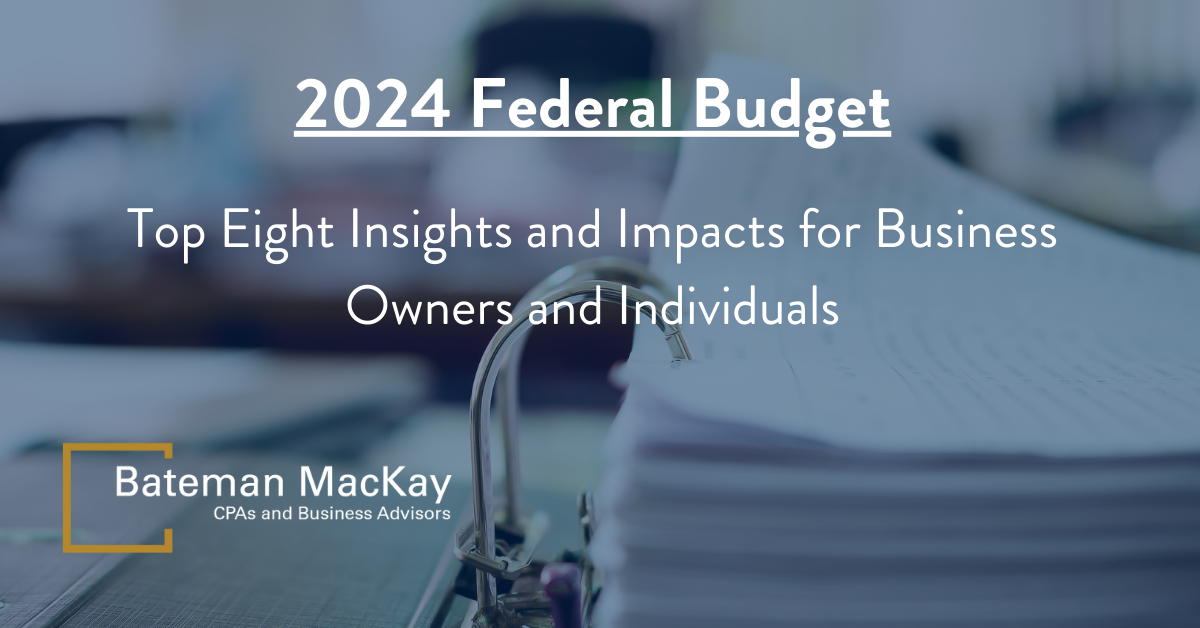Our 2024 Federal Budget article highlights the matters most relevant to the majority of our business owner clients. Click here to download our more comprehensive Federal Budget commentary.
On April 16th, 2024, the Deputy Prime Minister and Finance Minister, the Honourable Chrystia Freeland, presented the 2024 Federal Budget (“the Budget”). Titled “Fairness for Every Generation,” this Budget focuses on addressing home affordability through building and saving incentives, clean economy changes and several notable changes to the way capital gains are taxed.
The Budget contained no changes to personal or corporate income tax rates but does increase the taxable income inclusion rate for capital gains in certain situations. The 2023-24 deficit is expected to be $40.0 billion which is mostly in line with the 2023 Budget projected deficit for the same time period of $40.1 billion and projects a declining but persistent deficit through 2028-2029.
For a detailed look at how these changes may impact business owners, subscribe to our blog or follow us on LinkedIn for information about a forthcoming Breakfast with the Tax Team webinar presented by our Tax Team.
2024 Budget Highlights:
- Effective June 25, 2024, the capital gains inclusion rate increases to 2/3, except for individuals on the first $250,000 per year, who retain a 50% inclusion rate. Similar rules apply to stock options and capital losses.
- The lifetime capital gains exemption limit rises to $1,250,000 from $1,016,836 starting June 25, 2024, with inflation indexing from 2026.
- From 2025, the newly created Canadian Entrepreneurs’ Incentive enables qualifying shares held by founding shareholders for over five years to benefit from a reduced capital gains inclusion rate of 25% or 1/3, subject to stringent conditions. The amount of capital gains subject to this reduced inclusion rate will be in respect of capital gains of up to $2,000,000. The incentive will be phased in by increments of $200,000 per year, commencing January 1, 2025, when the measure comes into force, until it reaches $2,000,000 by January 1, 2034.
- A $10 million capital gains exemption applies to shares sold to an employee ownership trust in transactions between 2024 and 2026, with strict eligibility requirements.
- The Alternative Minimum Tax (AMT) regime will be adjusted further, to target high-income earners and certain trusts, with increased charitable donation tax credits and specific exemptions for Indigenous trusts.
- For CCPCs who file a 2023 tax year end by July 15, 2024, a refundable Canada Carbon Rebate for Small Businesses tax credit will be available, in selected provinces, calculated based on the number of employees.
- A 10% accelerated Capital Cost Allowance (CCA) rate applies to new purpose-built rental projects starting construction between April 16, 2024, and December 31, 2030. Additionally, immediate 100% expensing for certain new property classes acquired and available for use by 2027.
- Starting July 2025, eligible Canadians aged 18-64 can receive a maximum annual Canada Disability Benefit of $2,400, contingent upon regulatory approval and disability tax credit eligibility.
Capital Gains Changes
Capital Gains Inclusion Rate
For dispositions on or after June 25, 2024, the inclusion rate will be increased from 50% (1/2) to 66.7% (2/3). For taxation years that straddle that date, the inclusion rate will depend on the date of disposition. Individuals (other than trusts) will retain the 50% inclusion rate on the first $250,000 of capital gains per year (or for the period from June 25 to December 31, 2024). Other taxpayers, including corporations and trusts, will be subject to the 2/3 inclusion rate on all capital gains. Similar measures will apply to stock options benefits and capital losses carried back or forward.
Lifetime Capital Gains Exemption
The lifetime limit will be increased to $1,250,000 (from $1,016,836) effective for dispositions on or after June 25, 2024. Beginning in 2026 this amount will be indexed for inflation.
Canadian Entrepreneurs Incentive
Beginning in 2025, the capital gains inclusion rate on certain shares will be eligible for halved capital gains inclusion rate. Stringent requirements apply, including the taxpayer would be required to have been a founding shareholder with a significant interest (over 10% of votes and value) that owned the shares and was active in the business for at least five years immediately preceding the sale. Individuals will accrue $200,000 per year until January 1, 2034 when the incentive is fully implemented at $2,000,000. If all criteria are met, this would allow individuals to shelter $1.25M of gains utilizing the capital gain exemption, with a further $2M of gains having only 1/3 inclusion rate.
Employee Ownership Trust Tax Exemption
As announced in last year’s Fall Economic Statement, individuals disposing of shares to an employee ownership trust in a qualifying business transfer that occurs between January 1, 2024, and December 31, 2026, will be eligible for $10 million capital gains exemption. Several stringent requirements apply including: the vendor (or spouse or common-law partner) must have been actively engaged in the qualifying business for at least 24 months, and multiple vendors must share the $10 million limit. There are also certain “disqualifying events” which can retroactively reverse the exemption if they take place within 36 months following the transfer.
Corporate Tax Changes
Canada Carbon Rebate for Small Businesses
An accelerated and automated process to provide direct carbon rebates (a refundable tax credit) to CCPCs with no more than 499 employees throughout Canada in the provinces where the federal fuel charge applies would be introduced (Ontario, Alberta, Saskatchewan, Manitoba, New Brunswick, Nova Scotia, Prince Edward Island, and Newfoundland and Labrador). The rebate would be calculated by multiplying the number of persons employed in the province by a payment rate to be specified. Once sufficient information is available from the 2023 taxation year, the rates for 2019-20 to 2023-24 will be announced.
Accelerated Capital Cost Allowance (CCA)
An accelerated CCA rate of 10% for new eligible purpose-built rental projects that begin construction on or after April 16, 2024, and before January 1, 2031, would be provided. Eligible property would be residential complexes with at least four private apartment units or 10 private rooms or suites. At least 90% of the units must be held for long-term rental.
In addition, immediate 100% CCA expensing for new additions of property in respect of the following three classes would be provided if the property is acquired on or after April 16, 2024, and becomes available for use before January 1, 2027: class 44 (patents or the rights to use patented information for a limited or unlimited period); class 46 (data network infrastructure equipment and related systems software); and class 50 (general-purpose electronic data-processing equipment and systems software).
Personal Tax Changes
Alternative Minimum Tax (AMT)
The measures introduced in Budget 2023 would proceed, subject to certain changes. The available donation tax credit under the AMT would be increased to 80% of the credit claimed for regular income tax. Exemptions from the AMT regime are processed for certain trusts established for the benefit of various Indigenous groups.
Canada Disability Benefit
Payments to eligible Canadians would begin in July 2025, following the successful completion of the regulatory process and consultations with persons with disabilities. A maximum benefit amount of $2,400 per year would be available for individuals between the ages of 18 and 64 eligible for the disability tax credit.
Bateman MacKay Can Help
Remember to subscribe to our blog or follow us on LinkedIn for information about a forthcoming Breakfast with the Tax Team webinar presented by our Tax Team which will provide a detailed look at how these changes may impact business owners.
Click here to download a full commentary on relevant Federal Budget items and reach out to a Bateman MacKay Business Advisor for guidance on how these budgetary changes may impact your business.





